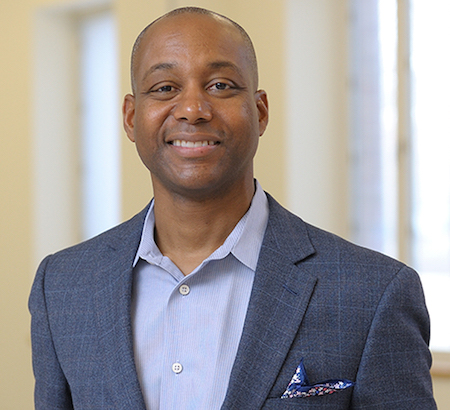
Gies College of Business at the University of Illinois
Byrne: And Kevin, you mentioned that Business 101 is in the freshman year. So I should remind everyone that you have a direct admit program for your undergraduate school and that on an annual basis you admit 600 students, and then 200 ultimately transfer in from the University, and 100 from outside.
Jackson: That’s right. At any given time, we’re up around between 3,100 and 3,200 students total in the undergraduate program.
Byrne: What are students going to learn in Business 101?

Kevin Jackson, associate dean of undergraduate studies at Gies College of Business
Jackson: It’s often easy to boil professional responsibility down to the things you shouldn’t do, but professional responsibility is also about things that you should do as a professional, as a person. How you engage with the company, the organization that you serve, but also how you engage with the community that you serve. So helping students grow kind of a broader perspective with what should be a goal in the business enterprise.
I love the Business 101 program. It’s not quite as clean as I’m going to portray it, but you can think of there being three parts to the course, and the first part, we’re not telling people what values they should have, or how to live their lives, but we’re helping them articulate what’s important to them, and the second part of the course is about thinking through the values of an organization, and an organization’s responsibility, and how their values match up with that. The idea of having a fit between your personal values and that of your employer is really important for employee satisfaction, motivation and performance going forward. Then, the final part of the course is thinking broadly about the idea of stakeholders and an organization’s role in society. We’ve had them do poverty simulations, all kinds of things just to give them a sense of the bigger world in which they live, the way that businesses can productively and positively impact societal problems while making money along the way.
Byrne: How did this actually get developed out of the curriculum review? Was there a lot of input from corporate recruiters, from students, from alumni? Or is this something that faculty dreamed up?
Brown: All of the above.
Jackson: The college put together a group of faculty who were responsible for connecting with other stakeholders, students, alums, and corporate partners. Based upon that information, we tried to think out of the box about what we can deliver to students and what experiences we could give students to best prepare them.
Brown: A really important part of the culture here at Gies is that our students are incredibly collaborative and helpful to each other. When you have a 99% job placement rate, they all know they’re going to get jobs. There’s not this sense that they have to get ahead of the person next to them, but rather they’re all working to achieve and excel, and they’re doing it together. It’s not at all uncommon to walk through our beautiful atrium down there and see students preparing for the same job interview, and they’re helping each other. It doesn’t even cross their minds that if I help you, that reduces my chances. That’s part of being intentional, that’s part of business on purpose. It’s getting our faculty and staff and our students to think about it in that way.
Byrne: As I think about what you’re doing with the new curriculum, my takeaway is that you’re speed tracking maturity. It can take many years in the workforce to develop the thinking, the confidence, the presentation skills that you’re shortcutting through these four cohort style courses. What you’re really doing is giving your business students a maturity that they otherwise wouldn’t have.
Jackson: That’s what we hear from those that come and hire our students. One of those things that attract them to our students is the level of maturity.
Byrne: Now one of the things students can do in the undergraduate program is major in one of eight different areas. And they after declare their major immediately after their sophomore year. Why exactly then?
Jackson: A lot of students aren’t sure what all these business major opportunities are, and so giving students a chance to explore in those first two years with courses from each of the disciplines is helpful. Then, we celebrate when they converge on when they choose their major. When I say celebrate, we really celebrate it. We have a signing day. Why should the athletes have all the fun? We bring in someone special. One year it was Lovie Smith our football coach, we’ve had the athletic director, and this past year we had Larry Gies, and his wife Beth, who gave us a lot of buzz among the students as they were waiting in line to shake his hand as he helped them reveal to the world on camera so their parents can participate in it as well.
Byrne: The most popular major at the school is something that the school is known for, it’s accounting. So 40% of the undergraduates major in accounting. And I thought, ‘Wouldn’t that be rather boring?’ But you have a chair of your accounting department who is an incredible dynamo, the most passionate advocate for accounting I’ve ever met in my life. She would make anyone want to study accounting.
Jackson: Absolutely.
Byrne: Why do you think after all these years that accounting is the preferred major of the largest chunk of undergraduates you have?
Jackson: I think there’s a couple of things to consider. One is that in some ways your reputation precedes yourself. There are some students who come to Gies College of Business because of the accounting program. That’s one reason but I also think it’s because we have a culture of innovation and being on the cutting edge. I think that holds true for all our disciplines and accountancy is no different. Being a front runner in the data analytics space, we have a fantastic fifth-year accounting option that gives students the ability to concentrate in data analytics, to pursue data analytics with more rigor. We also know that our placement rate of 99% isn’t lost in the accounting field. We have a large presence of accounting firms that come and mentor our students.
Byrne: I love what the chair of your accounting department says: ‘We don’t train accountants, we create leaders, and if you love capitalism you’ll love accounting because it’s a language of capitalism and business.’
Brown: Where we are today in this college is where the academic accounting profession is really built. All the way from the very beginning, and some of the early leaders in the field were on the faculty here, the authors of the textbooks were faculty here. We have leaders at all of the major public accounting firms and we’re one of the top couple of sources for Fortune 500 CFOs. So after decades and decades of excellence, and always being number one or number two depending on the ranking and the year, we are able to attract the very best talent, both on the student side as well as on the faculty side, and so it perpetuates. You walk around this building, and you’re going to see a lot of names of accounting alumni and accounting firms that have been very supportive of the college.-
Byrne: Including Larry Gies who gave the school a $150 million naming gift.
Brown: That’s right, he was in accounting.
Byrne: And the current CFOs of McDonald’s and SoulCycle among others.
Brown: And many more, on and on.
Byrne: Is there a data analytics major or not?
Jackson: There’s not a data analytics major per se, I think that the approach that we’ve taken with data analytics has been to instill that in all the spaces, all the different disciplines.
Brown: So the way I think about business analytics, or data analytics, is it’s a really powerful set of tools, but it’s most powerful when it is applied to a particular type of problem or business discipline. So we’re integrating it into every one of our majors. Whether you’re studying accounting or finance or marketing or strategy or supply chain, you are going to come out of here with strong training in business analytics.
Not only do we consider ourselves one of the great business schools, but we are on the campus of the University of Illinois, which has one of the best engineering programs anywhere in the world, one of the best computer science programs anywhere in the world. One of the best schools of information sciences. You just look across at the breadth and depth in the space, and that’s something we can really leverage. Any student who wants to study data analytics has an embarrassment of riches when they come here.











Questions about this article? Email us or leave a comment below.